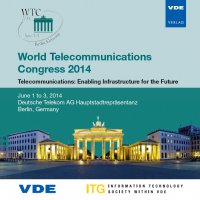Simulation and Complexity Analysis of Iterative Interference Cancellation Receivers for LTE/LTE-Advanced
Konferenz: WTC 2014 - World Telecommunications Congress 2014
01.06.2014 - 03.06.2014 in Berlin, Germany
Tagungsband: WTC 2014
Seiten: 6Sprache: EnglischTyp: PDF
Persönliche VDE-Mitglieder erhalten auf diesen Artikel 10% Rabatt
Autoren:
Mondin, M.; Bari, I. (DET, Politecnico di Torino, C.so Duca degli Abruzzi 24, 10129 Turin, Italy)
Melis, B.; Collotta, I.; Caretti, M. (Wireless Access Innovation, Telecom Italia Lab, Via Reiss Romoli 274, 10100 Turin, Italy)
Daneshgaran, F. (ECE, California State Univ., 5151 State University Dr., 90032 Los Angeles, USA)
Inhalt:
The paper details the simulation of a single user MIMO receiver operating according to the 3GPP/LTE standard applying a Parallel or Successive Interference Cancellation (PIC/SIC) strategy to a multicarrier (OFDMA/SC-FDMA) scheme. The algorithm details are analyzed and the PIC and SIC cancellation strategies are simulated and compared on random MIMO selective fading channels, considering limited complexities. The best PIC and SIC schemes for a given limited complexity (8 turbo decoding iterations per codeword) are compared for different codeblock lengths and spatial correlation scenarios over an EPA channel model. The 2 cycles SIC scheme shows the best performance over the selected scenarios, offering gains over the non-iterative schemes (measured at BLER values of 0.1) ranging from 1 to 4 dB in the considered cases. Larger gains are obtained with higher spatial correlation and shorter codeblock lengths. Better overall performance are obtained with lower spatial correlation and longer codeblock lengths.


